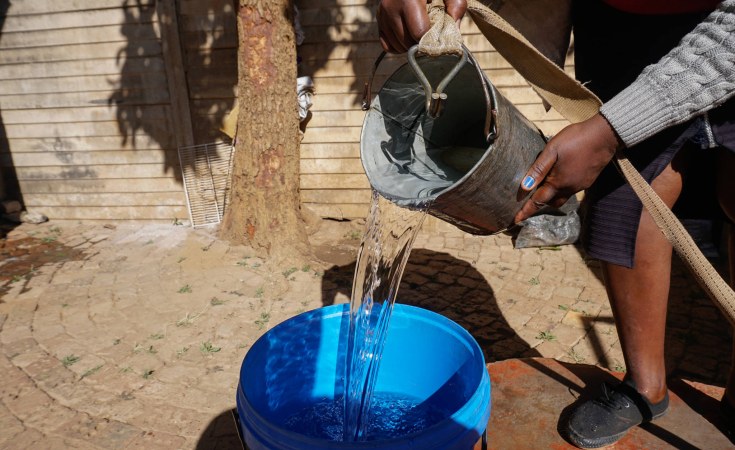Mutare — The number of cholera cases in Zimbabwe is declining thanks to the expanded and decentralized cholera response activities undertaken by the Ministry of Health and Child Care (MoHCC), supported by WHO and other partners. While current figures remain higher compared to the same period last year, this reduction is a welcome development, given the alarming surge between November and January this year.
At the peak of the outbreak in Manicaland Province, Lovemore Mudzingwa, an Environmental Health Practitioner (EHP) at Zvipiripiri Rural Health Centre, played a critical role. He tirelessly responded to rumors in the community, providing essential information and disinfecting homes of suspected patients after assisting with their transportation to the clinic.
Driven by a commitment to making a difference, Lovemore works hard to ensure his community has accurate information on cholera and other diseases. He actively identifies and addresses potential contamination sources, conducting regular inspections of water and food facilities to enforce hygiene standards.
"Our responsibility extends beyond responding to outbreaks," says Lovemore. "We strive to prevent them altogether. By educating communities on the importance of safe water, sanitation, and hygiene practices, we empower them to protect themselves and their families from cholera."
Lovemore's dedication saved lives.
In Mutorera Village, Zvipiripiri, his intervention helped 11 members of a single family survive cholera, with one succumbing to the disease.
One survivor, 21-year-old Clara Marime**, expresses her deep appreciation for Lovemore and the other health workers at Zvipiripiri. Coming from a religious group that often avoids modern medicine, her experience was particularly challenging.
"I'm grateful to be alive," she narrates. "By the time I reached the clinic, I was completely disoriented. I only realized where I was a day later."
While their efforts often go unnoticed, EHPs play a vital role in cholera outbreaks. They manage funerals during outbreaks, coordinate emergency response efforts, and provide crucial support to affected communities. From setting up cholera treatment centers to conducting contact tracing and disease surveillance, their expertise is vital for containing the spread of the disease and saving lives, not just from cholera.
Since February 12th, 2024, Zimbabwe has been grappling with a cholera outbreak. As of 11 May 2024, a total of 33,914 suspected cholera cases have been reported nationwide, with 87 confirmed deaths, 623 suspected deaths, and 3,963 confirmed cases. Manicaland Province alone recorded 6,596 cases during the same period.
In Zvipiripiri, WHO leveraged funding from the Health Resilience Fund (HRF) to strengthen the cholera treatment center. The facility was expanded from eight beds to twelve and provided essential medical supplies like rehydration fluids, antibiotics, and other cholera-specific treatment materials. Additionally, WHO supported the installation of sanitation facilities like waste pits and emergency latrines to promote hygiene and prevent further transmission. Triage points were also established to ensure an organized flow of patients and staff, minimizing infection risks. Furthermore, in November 2023, WHO provided the province with essential supplies including medicines, personal protective equipment (PPE), information, education, and communication (IEC) materials, and cleaning and disinfection supplies to bolster response efforts.
In addition, WHO, with the support from HRF and Central Emergency Response Fund (UNCERF), spearheaded training programmes for EHPs, reaching over 60 individuals from all districts across the country. These trainings focused on water quality monitoring, equipping EHPs with the knowledge and skills to effectively test and analyze water samples. To further strengthen water quality surveillance in communities and especially in CTCs, WHO procured and distributed water quality kits and consumables.
Additionally, WHO provided training on food safety for 115 EHPs, empowering them with current food trends, standards, and knowledge on foodborne illnesses. They gained valuable skills in preventing and controlling cholera and other diarrheal diseases, including vital measures to be implemented in communities and CTCs. On the job mentorship to EHPs on infection prevention and control and community engagement activities in CTCs and communities in response to the cholera outbreak is still being provided.
"The significant decline in cholera cases in Zimbabwe is a testament to the collective efforts of the MoHCC, WHO, and other partners. However, our work is far from over. We must continue to support communities to strengthen prevention efforts to ensure a lasting impact on public health," notes Dr Sally-Ann Ohene, WHO Zimbabwe Cholera Incident Manager.
**Names changed to protect identity of the contributor.


